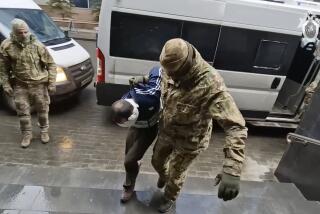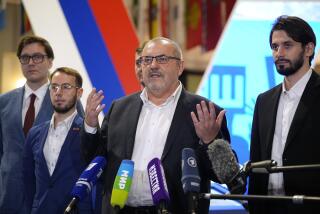Bad Days for Russians in Turkmenistan
- Share via
MOSCOW — Fearful Russians are lining up at Moscow’s embassy in Turkmenistan, apartment prices in that country’s capital are plunging and a war of words has broken out as politicians here denounce Turkmen President Saparmurad A. Niyazov.
Steadily worsening conditions for the ethnic Russian minority living in Turkmenistan since Soviet times deteriorated further in April when Niyazov gave dual citizens two months to choose which country’s passport to hold. Those picking Russia lose the right to own their homes, while those choosing Turkmenistan could end up trapped in the Central Asian country, according to Russian media reports.
Niyazov -- an eccentric leader who in recent years has promoted a personality cult around himself -- appears motivated by a desire to solidify his dominance and boost the country’s Turkmen character, observers say. Critics charge that under Niyazov, Turkmenistan has become one of the most totalitarian countries.
An estimated 300,000 ethnic Russians live in Turkmenistan, and about 100,000 of them have registered for Russian as well as Turkmen citizenship under a 1993 dual-citizenship treaty, Konstantin F. Zatulin, head of the CIS Countries Institute, said at a Moscow news conference this week. Some Turkmens also hold dual citizenship.
Thousands of Russians have scrambled in recent weeks to get Moscow’s embassy to stamp visas into their Turkmen passports, in case that proves to be the only way they can get out of the country, according to Russian media reports. Some have left, and competition to sell apartments has pushed prices to half or one-quarter their previous levels, reports say.
Those who fail to choose a country will be considered Turkmen citizens only, according to Niyazov’s decree, which Moscow has refused to recognize.
“Turkmens have been brought to such a level of submission that they no longer open their mouths,” a reporter in Turkmenistan for the Russian newspaper Moskovsky Komsomolets said in a telephone interview, speaking on condition that he not be identified by name for fear of reprisal.
“But Russians, who traditionally were able to read a lot and get information from various sources, are constantly complaining about something,” he said. “So the way out for Niyazov is either to fully control these unruly Russians by making them Turkmenistan’s nationals or, preferably, kick them all out of the country.”
Even though the deadline imposed by Niyazov expired Sunday, it remains unclear how rigorously the decree will be enforced.
Ethnic Russians who retained Turkmen citizenship will now be allowed to travel between the countries only on a Turkmen passport with an exit visa issued by the Turkmen Foreign Ministry and an entry visa from Russia, Interfax reported this week from Ashgabat, the capital.
“Niyazov has always feared and disliked Russians,” said Avdy Kuliyev, a former Turkmen foreign minister who now heads the country’s Moscow-based opposition. “The entire official policy was aimed at ousting the Russian-speaking population from Turkmenistan, which Niyazov thought was instrumental to consolidating Turkmenistan’s sovereignty and independence.”
But Niyazov’s greater goal has been “to consolidate his own dictatorship,” Kuliyev said. “If dual citizenship is abolished, people will no longer be able to enter or leave Turkmenistan without Niyazov’s control. He sees this as a pledge of trouble-free rule, where he will not need to explain anything to anyone.”
During a visit by Niyazov to Moscow in April, he and Russian President Vladimir V. Putin signed a natural gas deal and agreed to end the dual-citizenship treaty. Since then the two sides have been disputing what that means in practice.
Putin insists that despite Niyazov’s decree, dual citizens will retain that status. The only change agreed to so far is that people living in Turkmenistan can no longer obtain dual citizenship if they do not already have it, Putin says.
Some Russian media and politicians, as well as Russians in Turkmenistan, charge that Putin has taken a softer line on the citizenship issue because of Niyazov’s agreement to the gas deal. “Putin has sold us for gas,” is a common refrain of Russians in Ashgabat, according to a report in Moskovsky Komsomolets.
Niyazov predicted in April that the 25-year gas contract would be worth about $200 billion to Turkmenistan and $300 billion to Russia, Interfax reported.
Niyazov was the Communist boss of Turkmenistan in the final years of the Soviet Union. He has ruled the country of 4.7 million people since 1990, the year before it became independent.
On Thursday, 550 people crowded Moscow’s embassy in Ashgabat, Russian news agency Itar-Tass reported. Sixty registered to move to Russia; the rest received consultations and forms. It summarized the views of those seeking help this way: “There is no future for our children here. Schools offering instruction in the Russian language are few. All classes in Turkmen colleges have been conducted in the Turkmen language for a long time.”
Russia’s Union of Right Forces Party, in a statement Friday, compared Niyazov’s treatment of ethnic Russians to “Stalin-era deportations.”
Niyazov, responding to the growing uproar, declared in comments reported by Interfax that Moscow could send a delegation to investigate, and “if you find a single Russian who has been insulted or is under persecution, we will apologize to him.”
Times staff writer Sergei L. Loiko and Alexei V. Kuznetsov of The Times’ Moscow Bureau contributed to this report.
More to Read
Sign up for Essential California
The most important California stories and recommendations in your inbox every morning.
You may occasionally receive promotional content from the Los Angeles Times.










